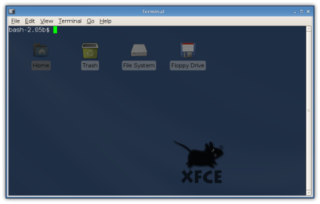A handful of Red Hat engineers are excited about a new tool they’ve developed called Func, short for Fedora Unified Network Controller. They’re pretty sure that once the rest of the community catches on to just how useful Func is, they’ll be singing its praises too. Red Hat Community Development Manager Greg DeKoenigsberg says, "This is the kind of idea where everyone kind of nods and says, ‘I meant to write that.’"
Monthly Archives: December 2007
When your computer needs to run programs that are bigger than your available physical memory, most modern operating systems use a technique called swapping, in which chunks of memory are temporarily stored on the hard disk while other data is moved into physical memory space. Here are some techniques that may help you better manage swapping on Linux systems and get the best performance from the Linux swapping subsystem.
Linux.com ran an article headlined GNOME Foundation defends OOXML involvement on November 23. Jeff Waugh, the press officer on the GNOME Foundation Board, was prominently mentioned in that article and in several others to which it links. So was Roy Schestowitz, who wrote a post titled Anti-symbiosis: ODF, OOXML, Mono, GNOME, and OpenOffice.org on the Boycott Novell site, where he is a regular contributor. We thought getting them together might be illuminating.
Two recently released text-to-speech extensions can transform Firefox into a talking Web browser suitable for users with visual impairments — and anyone else who can use a speech interface to the Web. Fire Vox is designed to be a full-fledged "screen reader in a browser," usable for daily browsing even for unsighted users. CLiCk, Speak provides point-and-click screen reading, which can be helpful for partially-sighted users or sighted users who have written language difficulties (such as dyslexia).
Found this video on youtube where user criticizes MS Office’07 and recommending on switching to OOo, version 2.3 in this video. His words go on to say:
“I strongly advise you don’t get Microsoft Office 2007 – any of the editions – you ARE getting ripped off!!” and …. “And if you have a Mac, download NeoOffice, a better version of OpenOffice for Mac users:”
Intel Based Macs: http://gulus.usherbrooke.ca/pub/appl/…
Other based Macs: http://www.planamesa.net/neojava/down…
{ …. but why uninstalled it !!!}
To Download OpenOffice, go to: http://download.openoffice.org/
 This week in DistroWatch Weekly:
This week in DistroWatch Weekly:
- Reviews: A grand overview of popular desktop distributions
| Ubuntu | PCLinuxOS | openSUSE | Fedora | Mint | Sabayon | MEPIS | Freespire | |
| Ease of installation |  |
 |
 |
 |
 |
 |
 |
 |
| Ease of use |  |
 |
 |
 |
 |
 |
 |
 |
| Package management |  |
 |
 |
 |
 |
 |
 |
 |
| Speed |  |
 |
 |
 |
 |
 |
 |
 |
| Average | 8.75 | 8.5 | 7.75 | 6.5 | 9 | 6 | 7.25 | 8 |
- News: Ubuntu “Hardy Heron”, openSUSE Weekly News, Mandriva Flash and Linutop,
- Fedora release history, interview with Eric Sandall from Source Mage, Foresight 2.0 plans
- Released last week: CentOS 5.1, Damn Small Linux 4.1
- Upcoming releases: Frugalware Linux 0.8 Pre 1
- Donations: MEPIS receives US$300
- New additions: Vixta.org
- New distributions: Jazz Linux, Pendrive Linux, ZXMameCD
- Reader comments
Read more in this week’s issue of DistroWatch Weekly….


“Really the big basic difference is that Ubuntu is a simplified cookie cutter distribution designed to not overwhelm the new user with choice. openSUSE on the other hand is the polar opposite offering choices for every aspect of Linux computing. openSUSE is very scalable and it can be as easy or advanced as one needs. You could install openSUSE on a dozen machines and none be the same if that was your wish, whereas install Ubuntu on a dozen machines and it would be exactly alike except some might not be able to connect to the internet.”
“There really isn’t much of a comparison between these two distros as they are so vastly different in target audience, capabilities, and philosophies. If you are a brand new Linux user perhaps you should get your feet wet with Ubuntu as openSUSE might seem a bit overwhelming. After a coupla weeks and you begin to feel claustrophobic, then branch out to try openSUSE. If you have any Linux or advanced Windows experience, then you might prefer the functionality found in openSUSE.”
 Xfce 4.4.2 is now available. It’s the second maintenance release in the 4.4 stable series, focusing on fixing bugs and updating translations.
Xfce 4.4.2 is now available. It’s the second maintenance release in the 4.4 stable series, focusing on fixing bugs and updating translations.
Xfce 4.4.2 Changes include:
Window Manager (xfwm4):
Be more relax with transients, allow transients to be sticky independently of their parent window (Bug #3296).
Fix xfwm4 hanging with gtk+-2.11.x (Bug #3346).
Plug a leak in mouse button grab when changing theme.
Fix dialogs and modals without parents not being automatically centered like before (Bug #3278).
Fix modifier mask not working with all keymaps (Bug #3194).
Fix wrong count of key shortcuts causing switch to last workspace on modifier key press if no window is focused (Bug #3191).
Fix spec file missing from the tar ball causing ‘make dist’ to fail.
Fix strict bound checking causing wrong window to be focused in focus follow mouse (Bug #2781).
Transients for group shouldn’t apply to other transients, or it breaks stacking for some apps, noticeably mozilla “save as” dialog…
Fix typo breaking compilation on systems without XShape 1.1 support.

Full Changelog |  Downloads |  Full Annoucement
Creating Your Own Custom Ubuntu 7.10 Or Linux Mint 4.0 Live-CD With Remastersys
This guide shows how you can create a Live-CD from your Ubuntu Gutsy
Gibbon or Linux Mint 4.0 system with a tool called remastersys.
Remastersys is available in the Linux Mint romeo
repository. You can customize your Ubuntu/Linux Mint system and then
let remastersys create an iso image of it which you can then burn onto
a CD/DVD.
Configuring SSH To Use Freeradius And WiKID For Two-Factor Authentication
Radius is a great standard. It is powerful enough to accomplish a great deal and simple enough to be easy to handle. Freeradius
is an excellent, open source radius server that ships with many Linux
variants. It is well documented and well supported. The WiKID Strong
Authentication server is a commercial/open source two-factor
authentication system that uses public key encryption to transmit PINs
and one-time passcodes securely to software tokens running on
Blackberries, cell phones, Palms, PocketPCs or, using the J2SE client,
Linux, Macs and Windows PCs. You can think of WiKID like certificates,
but without the hassles of white lists/black lists and more secure –
because the PIN is validated on the server preventing offline
brute-force attacks.
